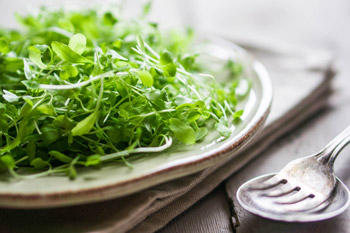 Due to their high nutritional value, sprouts are considered to be a wonder food. Sprouts are rich in many nutrients and are also known to improve blood sugar levels and lower risk of heart disease. However, when you buy sprouts, you should know that they may contain some foodborne illnesses.
Due to their high nutritional value, sprouts are considered to be a wonder food. Sprouts are rich in many nutrients and are also known to improve blood sugar levels and lower risk of heart disease. However, when you buy sprouts, you should know that they may contain some foodborne illnesses.
Sprouts are germinated seeds that have been allowed to grow into young plants. They can be either consumed as raw or cooked. They purify the blood and strengthen the immune system to fight against several diseases. This health rejuvenating food is rich in fiber, protein, minerals, vitamins and enzymes.
Many grains, legumes and seeds are sprouted such as bean and pea sprouts (lentil, garbanzo, soybean, black bean, kidney bean, and green pea), sprouted grains (brown rice, buckwheat, quinoa and oat sprouts), vegetable or leafy sprouts (radish, broccoli, beet, mustard green, clover, cress and fenugreek sprouts), and nut and seed sprouts (almond, radish seed, pumpkin seed, sesame seed or sunflower seed sprouts).
The health benefits of sprouts include:
- Nutritious: Sprouts are a rich source of nutrients, antioxidants and beneficial plant compounds. They contain a significant amount of protein and dietary fiber, as well as vitamin K, folate, pantothenic acid, niacin, thiamin, vitamin C, vitamin A, and riboflavin. Sprouts also contain manganese, copper, zinc, magnesium, iron, and calcium.
- Control blood sugar levels: Studies have found that sprouts help people with type 2 diabetes by controlling blood sugar levels.
- Improve digestion: Sprouts tend to contain higher amounts of insoluble fiber and enzymes, which can ease digestion and reduce the likelihood of constipation. Enzymes can help boost various metabolic processes and chemical reactions within the body, specifically when it comes to digestion as they are an important part of the digestive process.
- Boost metabolism: Protein helps in creation and maintenance of cells, organ repair, skin regeneration, bone growth, and muscle development. Sprouts contain a wealth of proteins that can boost metabolism and improve the overall functioning and development of your body.
- Improve heart health: As a great source of omega-3 fatty acids, sprouts can actually reduce the amount of harmful cholesterol in your blood vessels and arteries. They may improve heart health by lowering “bad” LDL cholesterol, total cholesterol and blood triglyceride levels, while increasing “good” HDL cholesterol. Sprouts also increase circulation and oxygenation while reducing clotting and lowering the risk of atherosclerosis, heart attacks, and strokes.
- Weight loss: As sprouts are high in nutrients and low in calories, you can eat them without compromising your diet. The fiber in sprouts make you feel full, which can reduce snacking and overeating between the meals – two main causes of obesity.
- Prevent cancer: Sprouts are full of antioxidants that contend free radicals and act as a panacea for many diseases, making them a very good anti-cancer dietary choice.
While sprouts come with innumerable benefits, they are also associated with risks of food poisoning. A Healthy Diet Base article notes: “Sprouts can contain foodborne illnesses and many people at risk when they eat sprouts raw, especially children, pregnant women and the elderly. People with weak immune system should also avoid eating raw sprouts”.
The reason raw sprouts are risky is because they are grown in warm, humid conditions in which harmful bacteria such as E. coli and Salmonella also thrive. The risks are higher as sprouts are eaten raw or only slightly cooked. According to Healthline, risks of contamination can be reduced by buying only chilled sprouts, storing them in the fridge and washing hands well when handling raw sprouts. Also, avoid buying sprouts with a strong smell or slimy appearance.
